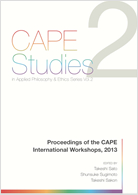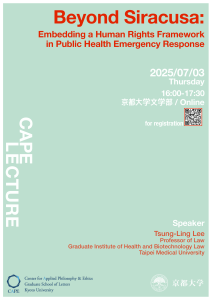
Proceedings of the CAPE International Workshops, 2013 A collected volume of papers presented at the CAPE International Conference "Ethics and Well-being" (November 9-10, 2013, Kyoto, Japan), and the CAPE International Conference "A Frontier of Philosophy of Time" (November 30 - December 1, 2013, Kyoto, Japan).
8月18日に予定されていたNancy S. Jecker先生によるCAPEレクチャーは諸事情により延期となりました。
開催日が決まり次第、CAPEホームページにて周知いたします。
CAPEレクチャー2件について情報を更新しました。
よろしくご確認ください。
第240回CAPEレクチャー
Date: 2025年 8月18日(月) 1600-1730
Place:京都大学吉田キャンパス文学部校舎 地下大会議室(map8番の建物)
Speaker: Nancy S. Jecker (JSPS BRIDGE fellow, University of Tokyo Department of Bioethics, and Professor of Bioethics and Humanities, University of Washington School of Medicine)
Title: Designing Ethical AI: Ensuring Chatbots and Social Robots for Mental Health are Culturally Competent and Person-Centered
第238回CAPEレクチャー
Date: 2025年 7月 9日(水) 1630-1800
Place:京都大学吉田キャンパス文学部校舎 一階会議室(map8番の建物)
Speaker: Bhaskarjit Neog (Associate Professor, Centre of Philosophy, School of Social Sciences, Jawaharlal Nehru University, New Delhi, India)
Title: Fixity and Fluidity of Moral Blameworthiness: Collective and Artificial Agents
詳しくはこちらからご覧ください。
レクチャーのお知らせです。
第238回CAPEレクチャー
日時: 2025年 7月22日(火) 1700-1830
開催場所: 京都大学吉田キャンパス文学部校舎 地下大会議室
講演者(Speaker): Professor Peter Shiu-Hwa Tsu (Department of Philosophy, Chung Cheng University)
タイトル(Title): Rationality, Embeddedness, and Imaginary Cases in Ethics.
詳しくはこちらからご覧ください。
Date: 2025年 7月3日(火) 1600-1730
Place:京都大学吉田キャンパス文学部校舎 地下大会議室(map8番の建物)
Speaker: Tsung-Ling Lee (Professor of Law, Graduate Institute of Health and Biotechnology Law, Taipei Medical University)
Title: Beyond Siracusa: Embedding a Human Rights Framework in Public Health Emergency Responses
Abstract: The Siracusa Principles provide authoritative interpretive guidelines for the International Covenant on Civil and Political Rights (ICCPR), delineating limits on rights restrictions during emergencies. The Siracusa Principles are designed to ensure that any limitations on human rights meet the standards of necessity, proportionately, and legality. However, the COVID-19 pandemic exposed significant shortcoming of the Siracusa Principles—their narrow focus on civil and political rights, overly general nature, and lack of robust accountability mechanisms. To address these shortfalls, leading health experts formulated the Principles and Guidelines on Human Rights Public Health (PHE Principles) through a three-year initiative spearheaded by the International Commission of Jurists and the Global Health Consortium (GHLC). This presentation examines how the PHE Principles aim to strength the human rights protections during public health crises by building upon the Siracusa Principles. The PHE Principles broaden protections to encompass not only civil and political rights but also economic, social, and cultural rights—with a particular focus on the right to health. By providing more detailed and comprehensive guidance, the PHE Principles aim to assist governments in navigating future health emergencies while embedding a rights-based approach into their pandemic preparedness, prevention, and response.
その他: 出席のお申し込みはGoogleフォームまたはポスター記載のQRコードからお願いたします。

Date: 2025年 6月23日(月) 1500-1700
Place:at the 1st floor of the building of the Graduate School of Letters, Kyoto University(map8番の建物)
Speaker: Bronwyn Finnigan (Visiting Associate Professor, Australian National University)
Title: Is the Buddha’s Lucky Throw Unlucky?
Abstract: Finnigan (2024) used decision-theoretic tools to argue that the Buddha, in the Apaṇṇaka Sutta, presents a decision-problem under uncertainty about whether to ‘wager’ for karma and rebirth. It showed that he resolves this decision-problem using dominance (superdominance, even superduperdominance) reasoning, but raised three objections to the idea that we are rationally required to accept this wager: the many rebirths objection, the redundancy objection, and the unnecessary expectations objection. Nevertheless, the article ended with a motivational concession: the Buddha’s Wager might at least provide one more reason for someone to act well, if they so needed. This is because the two kinds of outcomes the wager envisions – social and karmic – depend on the individual using the view at issue to inform their conduct. This talk examines a challenge to that concession; namely, that it undermines the rationality of the wager by providing a bad reason for acting well. Call this the self-undermining objection. The Buddha describes his wager as a “lucky throw” that, when “accepted and undertaken… will lead to welfare and happiness for a long time.” Does accepting this wager actually constitute an “unlucky throw”—one that ultimately undermines the very welfare and happiness the Buddha asserts the wager would bring?
Date: 2025年05月13日(火) 1700-1830
Place:京都大学吉田キャンパス文学部校舎 地下大会議室(map8番の建物)
Speaker: Chen Hai (East China Normal University, Shanghai, China)
Title: Why Strength Argument is not a Good Defense for Moral Intuition
Abstract: Dario Cecchini claims that moral intuitions are experienced with different levels of strength and agents accept only strong intuitions, not vulnerable to bias under realistic circumstances. I labeled his defense for moral intuition with intuitive confidence as “strength argument”. Although I belong to the camp of moral intuition supporters, I believe that Cechini’s strength argument is not a good justification for moral intuition from the reliability challenge. First of all, strength argument will lead us to subjectivism, psychologism, and, most importantly, such argument will fail to withstand the reliability challenge. Furthermore, it is an impossible mission to distinguish the strength of people’s different moral intuitions. Last but not least, it is unnecessary to classify the strength of moral intuitions as well. Intuition can be strong or weak, but different strengths of intuition are merely phenomena, not and should not be viewed as the essence of intuition. Instead, I will address reliability challenge by analyzing the structure of moral intuition.
宇宙倫理学教育プログラム(SEEP)では2025年度の受講生(学部生・大学院生・一般)を募集しています。応募締め切りは4月2日です。
プログラムの概要や応募の方法については以下のURLを参照してください。
https://www.usss.kyoto-u.ac.jp/wp-content/uploads/2025/03/seep_application-guidelines_2025.pdf
本プログラムは京都大学理学研究科サイエンス連携探索センター(SACRA)が主催し、文学研究科応用哲学・倫理学教育研究センター(CAPE)が協力する形で運営されています
日時:2025年3月10日(月) 10時〜17時
場所:阪神・淡路大震災記念 人と防災未来センター東館1階 こころのシアター(車いすスペース有) 〒651-0073 兵庫県神戸市中央区脇浜海岸通1丁目5−2
参加申し込みフォーム:こちら
ワークショップのお知らせです。
Philosophical Issues at the End of Life
Date: 27 th February 2025
Time: 1400 – 1730
Venue: Lecture Room 6, 2 nd Floor Faculty of Arts Building, Yoshida Campus, Kyoto University
Faculty of Arts Building – 京都市左京区吉田本町 京都大学文学研究科 第6講義室
詳細はこちら